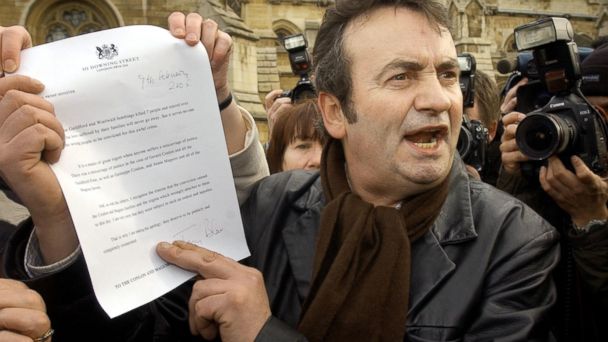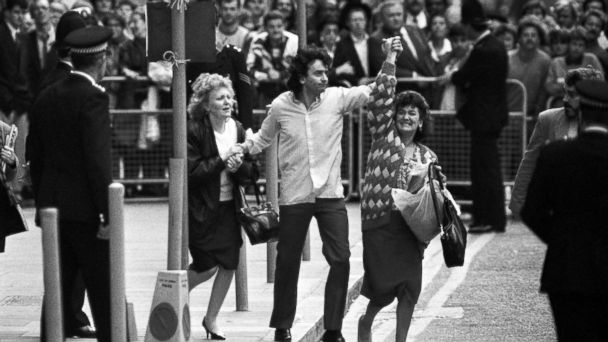Guildford Four's Gerry Conlon, Wrongfully Jailed for IRA Bombing, Dies at Age 60

Gerry Conlon appears outside the House of Commons showing the media the letter of apology he received from Prime Minister Tony Blair for him being wrongly convicted of the Guildford pub bombings in this Sept. 9, 2005 file photo. Stefan Rousseau/PA Wire via AP Images
Gerry Conlon, who was wrongly accused of a bombing carried out by the Provisional Irish Republican Army (IRA) in 1974, died Friday night at age 60 in his home in Falls Road, Belfast, following a long battle with cancer.
Conlon, along with three others - Paul Hill, Patrick Armstrong and Carole Richardson - was convicted by the English courts in 1975 and sentenced to life in prison for the 1974 bombing of a pub in Guildford, England. They become known as the Guildford Four and were victims of forceful police coercion, and confessed to the bombings.
Paul Hill knew Conlon from his school days and their paths crossed again in 1974 in London during that period of intense bombing by the IRA on the British mainland.
"Gerry had no political interests whatsoever. Rather he was a happy go lucky 19-year-old whose only interests were music, football and like every young man of his age, girls," Hill reminisces.
In response to the bombings, the British hurried legislation through Parliament called the Prevention of Terrorism Acts, which gave police forces emergency powers where they suspected any act of terrorism.
Under these provisions, the Acts allowed the Guildford Four to be held incommunicado for seven days.
During those seven days they were stripped naked and beaten by police officers, enduring interrogations by the Guildford police, the bomb squad and members of Scotland Yard's anti-terrorism police, lasting 20 hours at a time.
"Threats were made against members of our families and mock executions took place during which firearms were put in my mouth and against my head - the weapon being dry fired," Hill said.
During this time of grueling interrogation and torture, evidence was fabricated by the police officers, who before the interviews even took place wrote in their notebooks information they claimed the Four had told them.

Gerry Conlon, center, is seen outside the Old Bailey after being released for being wrongly convicted of the Guilford pub bombings, in London, Oct. 19, 1989. AP Photo/PA Wire.
Conlon described the pain of losing 15 years of his life, knowing he was innocent, in an emotional account published in The Guardian in 2009.
"For the first two years, I still had a little bit of hope. I would hear the jangling of keys and think that this was the time the prison officers were going to come and open the cell door and set us free," Conlon wrote.
"But after the Maguire Seven (all also wrongly convicted) - my father among them - were arrested, we started to lose that hope," he wrote. "Not only did we have to beat the criminal justice system but we also had to survive in prison. Our reality is that nightmare. They would urinate in our food, defecate in it, put glass in it. Our cell doors would be left open for us to be beaten and they would come in with batteries in socks to beat us over the head. I saw two people murdered. I saw suicides. I saw somebody set fire to himself in Long Lartin prison."
It was not until 1989 that the Guildford Four were released. The Court of Appeal in London stated the police manufactured evidence and their convictions were ultimately deemed "incorrect and unsatisfactory." There was never any indication that any of the Guildford Four were associated with the IRA.
"Gerry Conlon was an ordinary man, thrust into extraordinary circumstances," Hill remembers. "If Gerry Conlon is owed anything for his suffering, it is that we learn from his ordeal."